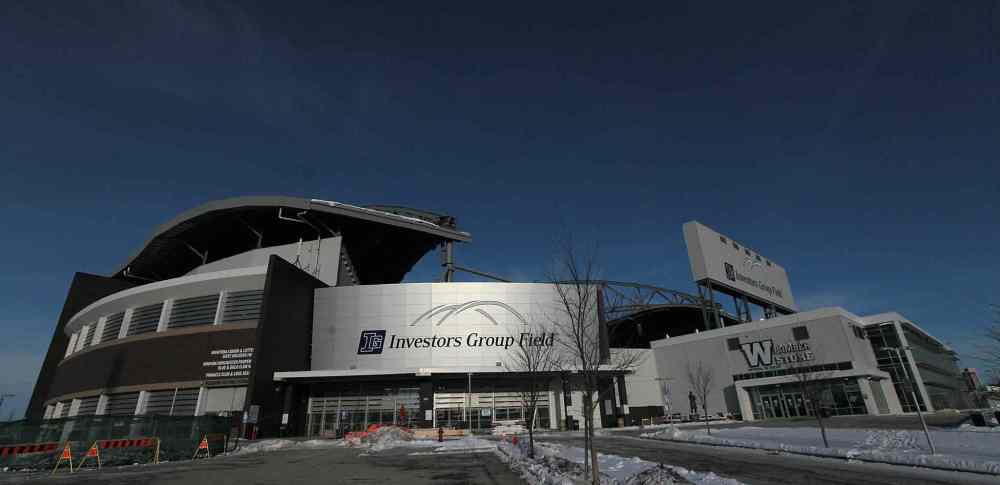Will stadium debt hobble the Blue Bombers?
Advertisement
Read this article for free:
or
Already have an account? Log in here »
To continue reading, please subscribe:
Monthly Digital Subscription
$0 for the first 4 weeks*
- Enjoy unlimited reading on winnipegfreepress.com
- Read the E-Edition, our digital replica newspaper
- Access News Break, our award-winning app
- Play interactive puzzles
*No charge for 4 weeks then price increases to the regular rate of $19.00 plus GST every four weeks. Offer available to new and qualified returning subscribers only. Cancel any time.
Monthly Digital Subscription
$4.75/week*
- Enjoy unlimited reading on winnipegfreepress.com
- Read the E-Edition, our digital replica newspaper
- Access News Break, our award-winning app
- Play interactive puzzles
*Billed as $19 plus GST every four weeks. Cancel any time.
To continue reading, please subscribe:
Add Free Press access to your Brandon Sun subscription for only an additional
$1 for the first 4 weeks*
*Your next subscription payment will increase by $1.00 and you will be charged $16.99 plus GST for four weeks. After four weeks, your payment will increase to $23.99 plus GST every four weeks.
Read unlimited articles for free today:
or
Already have an account? Log in here »
Hey there, time traveller!
This article was published 04/01/2016 (3599 days ago), so information in it may no longer be current.
It was a construction boondoggle, for sure. Now it appears the business plan for Investors Group Field was also a disaster. Debt is growing faster than it is being retired, meaning the home of the Winnipeg Blue Bombers could become a financial liability far longer than originally forecast.
This could have serious implications for the struggling team itself, which was only able to meet its $4.5 million-debt payment last year because of revenue generated by hosting FIFA’s Women’s World cup of soccer games and the Grey Cup, as well as two concerts.
The Bombers are a community-owned team and its ability to field a top team should not be put at risk because of a flawed business plan and unreasonable expectations of debt payment.

(The team hasn’t had much success despite spending to the ceiling set by the Canadian Football League, but that’s another story.)
The city and province together paid just $1.3 million in 2015 against the $235-million debt. That’s far less than envisioned in the business plan, which calculated their payments in part on property taxes from the site of the former Winnipeg Stadium near Polo Park.
Unfortunately, the retail industry has not rebounded from the 2008 economic slump and the promised tax bonanza has not materialized. Target closed its brand-new stand-alone store at the site last year, leaving a swath of vacant property.
Premier Greg Selinger says he’s confident the Polo Park site will eventually generate the higher revenues needed by the province and city to pay their share of the stadium’s debt.
Hoping for the best, however, was not supposed to be part of the plan.
It’s reasonable to assume new businesses will eventually emerge, but just as reasonable to worry it could be several years before that happens.
Meanwhile, the Bombers are forced to dig into their revenues every year, while the province and city wait for an economic rebound to make their payments in full.
The province ignored the risk in developing the business plan, which seems today like more of a sales job than a real blueprint for building a new stadium at public cost.
The problems with financing the $180-million expansion of the RBC Convention Centre are a near carbon copy of the stadium fiasco.
It, too, was based on the hope something else would happen, in this case a new hotel that was supposed to pay off part of a $33-million loan in the form of new property taxes.
The hotel, of course, was never built and there is no plan for one. In addition, the hotel, which was to be located near the convention centre on city-owned land, was also needed to generate new business and revenue.
It is fair to demand some payment from the operators of the stadium, but the team has been saddled with $95 million in debt.
The Bombers earned profits of $2.9 million in 2013, the year the new stadium opened, and $3.9 million in 2014. That’s less than the minimum payments required under the province’s plan.
Premier Selinger has threatened to overhaul how the football club is governed if it reneges on its debt, which is a little rich for a leader who has failed to meet his own financial targets.
Nevertheless, the club’s board has been reluctant to embrace other models for public ownership of sports teams, including the Edmonton Eskimos and the Saskatchewan Roughriders.
These teams have involved fans in the management and election of club officers. It means their boards speak with moral authority and a louder voice, something the Bombers will need as they stare into a deep pit of debt.




